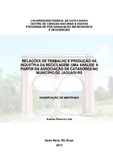| dc.creator | Lock, Andrea Pereira | |
| dc.date.accessioned | 2014-09-24 | |
| dc.date.available | 2014-09-24 | |
| dc.date.issued | 2013-09-04 | |
| dc.identifier.citation | LOCK, Andrea Pereira. LABOUR RELATIONS IN PRODUCTION AND RECYCLING INDUSTRY: AN ANALYSIS FROM THE ASSOCIATION OF THE MUNICIPALITY OF PICKERS JAGUARI-RS. 2013. 152 f. Dissertação (Mestrado em Geociências) - Universidade Federal de Santa Maria, Santa Maria, 2013. | por |
| dc.identifier.uri | http://repositorio.ufsm.br/handle/1/9384 | |
| dc.description.abstract | In Brazil, the National Politics of Solid Wastes, established in August 2010, is considered a historic landmark in the environmental management in the country. Since from this politics, the counties need to adapt itself the new norms and are responsible by management of their wastes. The present work has the objective understand the labor and production relations between the Association of Collectors Profetas da Ecologia of Jaguari RS, the town government and the purchasers of recyclable materials, before the National Politics of Solids Wastes. The methodology suggested is the qualitative abordage and the case study with strategy of research using as investigation tool the documental research, the dialog, interviews and observation in the technical visits, meetings, and workshops. The social actors involved in the research are the recyclable wastes collectors associated, the Municipal Government across the Planning and Environment Secretary and the purchaser of recyclable materials. The research was executed on the period of 2009, with the formation of Association, until the beginning of 2013. The work and the production of ARPEJ are fundamental to the community, since it performs the selective collection in town, getting better rent and lower allocation of waste to sanitary embankment; besides, collaborates with the healthy environment, with the prefecture, decreasing costs to municipal coffers. Highlights that was there advance in the social relations of collectors with the town government and with the community of Jaguary RS. Understands that the recycling industry provides opportunities work and rent for a portion of a population and provides a alternative in the economy of natural resources. Conclude, that remains to be made to the National Politics of Solid Wastes is applied to tows, which requires envelopment of all community and management process by government agencies. | eng |
| dc.format | application/pdf | por |
| dc.language | por | por |
| dc.publisher | Universidade Federal de Santa Maria | por |
| dc.rights | Acesso Aberto | por |
| dc.subject | Capitalismo | por |
| dc.subject | Reciclagem | por |
| dc.subject | Catadores | por |
| dc.subject | Associação | por |
| dc.subject | Capitalism | eng |
| dc.subject | Recycling | eng |
| dc.subject | Collectors | eng |
| dc.subject | Association | eng |
| dc.title | Relações de trabalho e produção na indústria da reciclagem: uma análise a partir da associação de catadores no município de Jaguari-RS | por |
| dc.title.alternative | Labour relations in production and recycling industry: an analysis from the association of the municipality of pickers Jaguari-RS | eng |
| dc.type | Dissertação | por |
| dc.description.resumo | No Brasil, a Política Nacional dos Resíduos Sólidos, instituída em agosto de 2010, é considerada marco histórico na gestão ambiental do País. A partir desta Política, os municípios precisam adequar-se às novas normas e são responsabilizados pela gestão dos seus resíduos. O presente trabalho tem por objetivo compreender as relações de trabalho e a produção, entre a Associação Recicladores Profetas da Ecologia de Jaguari - RS, o poder público municipal e os compradores de materiais recicláveis, perante a Política Nacional dos Resíduos Sólidos. A metodologia proposta é de natureza qualitativa e o estudo de caso como estratégia de pesquisa utilizando-se como instrumento de investigação a pesquisa documental, o diálogo, entrevistas e observação nas visitas técnicas, reuniões e oficinas. Os atores sociais envolvidos na pesquisa são os catadores de materiais recicláveis associados, o poder público municipal através da Secretaria de Planejamento e Meio Ambiente e o comprador de materiais recicláveis. A pesquisa teve como base o período de 2009, com a formação da Associação, até o início de 2013. O trabalho e a produção da ARPEJ são fundamentais para a comunidade, visto que realiza a coleta seletiva no município, obtendo melhor renda e menor destinação de resíduos ao aterro sanitário; além disso, colabora com o ambiente saudável, com a prefeitura perante suas atribuições, diminuindo o custo para os cofres municipais. Ressalta-se que houve melhoria nas relações sociais dos catadores com o Poder Público municipal e com a comunidade jaguariense. Compreende-se que a indústria da reciclagem oportuniza trabalho e renda para uma parcela da população e proporciona uma alternativa na economia dos recursos naturais existentes. Conclui-se que muito ainda deve ser feito para que a Política Nacional dos Resíduos Sólidos seja aplicada aos municípios, o que requer constante envolvimento de toda a comunidade e gestão do processo pelos órgãos públicos. | por |
| dc.contributor.advisor1 | Meurer, Ane Carine | |
| dc.contributor.advisor1Lattes | http://lattes.cnpq.br/6724702305350914 | por |
| dc.contributor.referee1 | Meller, Cleria Bitencorte | |
| dc.contributor.referee1Lattes | http://buscatextual.cnpq.br/buscatextual/visualizacv.do?id=K4708095D2 | por |
| dc.contributor.referee2 | Madruga, Lúcia Rejane da Rosa Gama | |
| dc.contributor.referee2Lattes | http://buscatextual.cnpq.br/buscatextual/visualizacv.do?id=K4764371U2 | por |
| dc.creator.Lattes | http://lattes.cnpq.br/4761634513099781 | por |
| dc.publisher.country | BR | por |
| dc.publisher.department | Geografia | por |
| dc.publisher.initials | UFSM | por |
| dc.publisher.program | Programa de Pós-Graduação em Geografia | por |
| dc.subject.cnpq | CNPQ::CIENCIAS HUMANAS::GEOGRAFIA | por |


